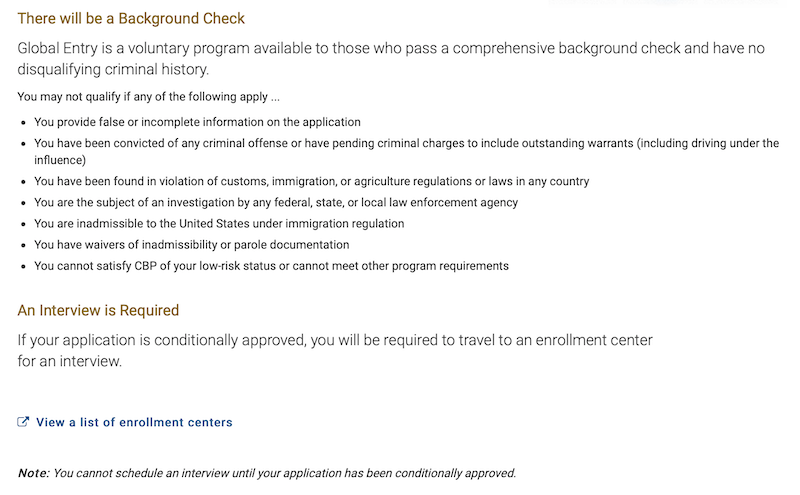It’s hard to believe it has been five years since I joined Global Entry. As I near renewal, I found an add-on that I couldn’t resist, the Asia Pacific Economic Co-operation card.
If you are considering booking travel or signing up for a new credit card please click here. Both support LiveAndLetsFly.com.
If you haven’t followed us on Facebook or Instagram, add us today.
Global Entry Renewal
I’d happily log a complaint with Customs and Border Protection that the process for renewing Global Entry is really rather daft – but no one would listen.
Renewing is essentially the same as starting over from scratch and according to the processing paperwork still requires an in-person interview. Mine is due soon and I thought I’d get a head start on getting it done.

Why Would I Want to Add APEC?
Over the last few years, I have traveled to Asia often. A family favorite destination is Bangkok, and we also find ourselves in Hong Kong. Earlier this year we visited Indonesia, Thailand, Laos, Thailand and Indonesia in that order. Passing through customs quickly as I would with Global Entry at home helps weary travelers like ourselves.
The Asia Pacific Economic Co-operation allows expedited customs entry for business travelers frequently visiting member nations. The program requirements note that ABTC (APEC Business Travel Card) is only available to government employees traveling to member nations on business and verified business travelers.
Be careful when disclosing countries visited to select the right one, some nations colloquially call the Democratic People’s Republic of Korea, North Korea, and the Republic of Korea, South Korea.

The Completion Process
The process is fairly simple. Applicants affirm that they have business in Asia and submit their application knowing that the associated governments will have access to their information.
A verified business person is described as follows:
A “verified business person” engaged in APEC business means a person engaged in the trade of goods, the provision of services or the conduct of investment activities in the APEC region. Professional athletes, news correspondents, entertainers, musicians, artists or persons engaged in similar occupations are not considered to be verified business travelers engaged in business in the APEC region when they are traveling in such a capacity.
A “U.S. government official” means a U.S. government official performing U.S. government activities that support the work of APEC.
In essence, it’s little more than paying an additional $70 fee and ticking a box. For the government bodies that determine approval, however, each has its own process:
“Applicants make a single application to the economy for which they hold a passport (home economy), or have permanent residence in the case of Hong Kong, China. If this economy assesses the application as meeting the relevant criteria, the applicant’s details are provided to the other participating economies who conduct their own assessment of whether to grant pre-clearance. When all economies have made a pre-clearance decision, the applicant receives an ABTC that lists the economies to which they have permission to travel. Each economy is responsible for managing the processing of their own pre-clearance applications and no economy has any influence over the processing timeframes of another.”
A government may decline ABTC acceptance while others may allow an applicant through, it’s not an all-or-nothing in the way that other services of this sort may be. Applicants must be approved for the Trusted Traveler program of their home country in addition to APEC member nations.

Conclusion
I wish I had known about the option to add this APEC card to my application when I first applied for Global Entry. I am curious as to the timeframe in which approvals or denials are processed by each country, I am already approved independently of this by Hong Kong so I would be surprised if I wasn’t at minimum accepted to the program for Hong Kong.
What do you think? Have you added an APEC ABTC card to your Global Entry membership? How has your experience been?




Unbelievably, that dropdown of countries even includes ones that don’t exist anymore (hello, Yugoslavia) and ones that are there twice (hello Myanmar, or uhm, “Burma”). There are more but those two stick out for me.
Pathetic.
I’m concerned as to what would happen if one selected Myanmar (as I did in the past) but not Burma (I don’t recall if I selected both.)
Not much of a mystery, I think: They are asking what countries you HAVE visited in the past. If that country has dissolved (or changed its name) since you where there, they still want to know where you have been.
So I have been to Myanmar, Burma doesn’t exist and hasn’t for 25 years. The system is less than ten years old. Which one do you select? Both?
Then you put down that you’ve been to Myanmar. Simple.
“The program requirements note that ABTC (APEC Business Travel Card) is only available to government employees traveling to member nations on business and verified business travelers. ” What does it mean by “verified business travelers?”
I have updated the post to include their description – in essence, it’s pretty loosely defined and the process for “verifying” it is unknown to me.
Be aware that APEC card usage can only be used on business travel trip – cannot be used for personal trips with family in tow. The rules are very explicit on this, with the example of an APEC holder cannot bring spouse through the same lane. Additionally, you need to prove that you have legitimate business reasons to visit participating countries, not for holiday. This would normally preclude kids.
Moreover, APEC is not expedited processing – instead of going through the normal line, you use the APEC or crew/diplomat line instead, which should have a shorter line but your results may vary.
Lastly, one of the side benefits is Mexico and Canada are also APEC participating countries, so you can use APEC card there as well.
If I were working abroad and my business was moving my family there, it would be legitimate business that my whole family would be there and as a former expatriate that happens often.
In my experience, hotels and airlines in some cities that provide VIP services, use the Diplomatic lane and we have been through there many times without the card – it seemed pretty lax.
That man is giving a good advice, yet you stubbornly insisted your point of view is the only correct ones. Such entitled person you are.
I soo waiting you write a long complaint in this blog that your family member was rejected on a trip only yourself deemed as business trip.
Why do you even read the blog James Howlett (Wolverine?)
Breaking the rules does not mean it’s legitimate. Here the FAQ:
Q: Is my spouse or child able to access the APEC lanes if they are traveling with me?
A: No. The U.S. APEC Business Travel Card is not transferable and applicable only to the card holder. Access to APEC lanes will not be extended to anyone traveling with the U.S. APEC Business Travel Card holder.
cbp.gov/travel/trusted-traveler-programs/apec-faqs
I have had the APEC card for years. It is very helpful and you should remember that it can be used both going into and out of a country. You will find that the APEC line is in most cases the same as the diplomatic line.
Readers should remember that APEC is NOT a replacement for a proper VISA and it is intended for business travelers, not holiday travelers.
APEC is also a program that the US Government has to renew their participation, so keep an eye on that.
Kyle is spot on that on balance this program is well worth the investment of the fee and interview time if you are a frequent business traveler to Asia.
How does Kyle qualify for APEC? Like, what’s the justification?
I have a job that sometimes requires travel to Asia.
That does not sound like it qualifies to me. Read the definition you provided:
“A “verified business person” engaged in APEC business means a person engaged in the trade of goods, the provision of services or the conduct of investment activities in the APEC region.”
How exactly does blogging meet those criteria? I have a feeling you may have a hard time convincing them that you do.
**As in Kyle has another job in addition this blog thing we read of his on the weekends. Same as Matthew Klint also having another job in addition to the blog and his award travel gig. Some of us folks have more than one job at a time.
If it is a true job and it requires frequent travel to asia, he would’ve have apec card a long, long time a go. Naah… He just stubbornly insisted this blogging is job. Hahaha
I have a job outside of blogging. Blogging doesn’t pay the bills, it’s a labor of love – except for James.
“Renewing is essentially the same as starting over from scratch and according to the processing paperwork still requires an in-person interview. Mine is due soon and I thought I’d get a head start on getting it done.”
-Entirely untrue…renewing is not the same as starting over. My global entry was due to expire in June of this year. In April, I went on the CBP website to renew, filled out the renewal application and paid the fee. The website told me to await notification on my renewal application process, and a couple days later I received an email about a “status change.” I logged into the CBP portal, and it showed my renewal was application was approved. No in person interview… I received a new Global Entry card in the mail a week later with the same photo as on my prior card good for an additional 5 years.
In the first 5 years of my Global Entry membership, I did not travel to any ‘flagged,’ for lack of a better term, countries. Perhaps in your numerous travels, you have been to some destinations that would by default require CBP to take an in person look at your renewal, but please don’t mislead your readers into thinking that their renewal process would be as tedious as yours. I can assure you from my experiences that it is not.
I have included a screenshot that shows the requirement for an interview on renewal – if you didn’t have such a requirement (and I hope I don’t have to schedule the same) then that’s great. However, I (and others) have to list out the countries visited again and since it’s a legal document, you can’t guess on what’s been visited in the last five years.
I haven’t been to any destinations that should cause concern (not even Cuba… yet.) While your experience might have gone quickly and easily, that does not mean that the process has materially changed.
I had a similar experience as Jason, above. I recall (and just verified by checking my screenshot) that the language re the interview was different – mine said (all caps mine):
“An interview MAY be required
If your application is conditionally approved, you MAY be required to travel to an enrollment center for an interview.”
I applied for renewal in March 2019. My Global Entry status had actually expired a couple months before, but I was still able to go through the renewal process. At the time (last spring) there was a long backlog (about 10 weeks!) for processing applications, due to the idiotic “government shutdown” that had occurred for a few days around the beginning of the year. Still, I simply went through the online process, filled out the form. Recalling the places I had visited in recent years – including Myanmar and several former Soviet republics – was an interesting exercise. The process went smoothly, though slowly. About 10 weeks after doing the online form, my new Global Entry card arrived in the mail.
FWIW I renewed a global entry in 2017 and 3 other family members have renewed their global entries in the last year without having to have an interview, as recently as June of this year. It would be unfortunate if things have changed since.
I hope that’s the case for me too. There shouldn’t be any reason unless something had changed which in my case, just the countries visited had altered.
Does the CSR or over cards reimburse the APAC Card fee as well?
Yes, as the charge would appear the same to Chase/Visa.
If I had already applied for Global Entry last year, could I add APEC to my existing Global Entry account?
Hi Kyle just be aware that in regards to Thailand you technically need a non-immigrant B visa if you are going to perform “work” (the law is pretty broad in its definition) while in country. This is true even if you plan to have meetings or attend a conference on behalf of your employer (or your own business). The truth is that I’ve never heard of anyone being fined under the law for just attending a meeting (I do it all of the time and I work for a multinational high tech company) but coming into the country with the APAC card may draw unwanted attention to you if you attempt to enter with a tourist Visa or 30 stamp on arrival.